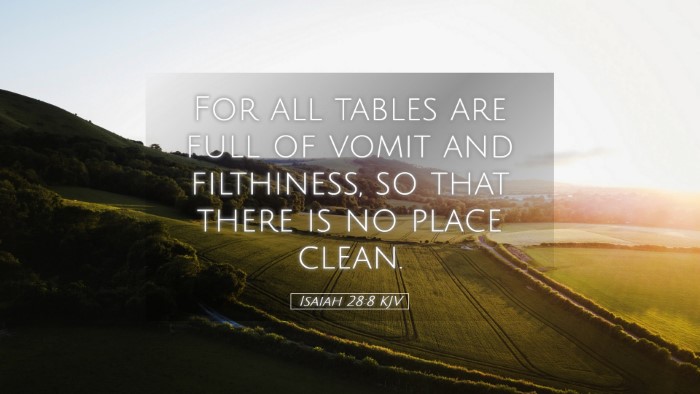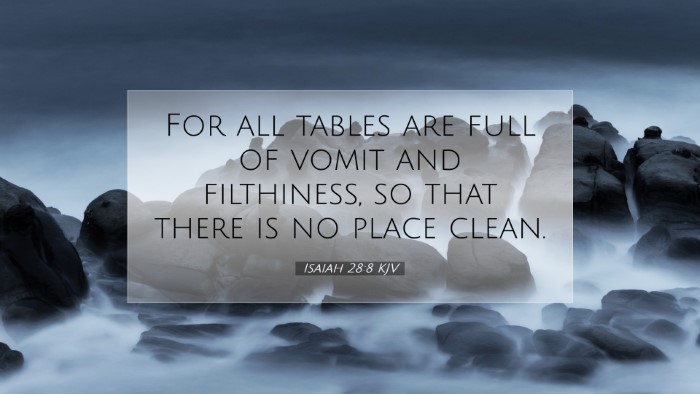Commentary on Isaiah 28:8
Verse: "For all tables are full of vomit and filthiness, so that there is no place clean."
Context and Introduction
This verse comes from a passage where the prophet Isaiah addresses the drunkenness and debauchery rampant in Ephraim, particularly the city of Samaria. It serves as a divine indictment against a people who have forsaken righteousness for temporal pleasures. Not only does Isaiah depict the state of moral decline, but he also highlights the consequences of turning away from God.
Exegesis of the Text
The language used in Isaiah 28:8 is graphic and powerful. It suggests a scene where the tables that should be a place of sharing and fellowship are instead overflowing with vomit and filthiness, symbolizing the moral and spiritual decay of the nation.
Literal Interpretation
As noted by Matthew Henry, the metaphor of “tables” indicates not only dining but also a broader depiction of societal norms. When tables that should be filled with food are instead filled with refuse, it illustrates a cultural rejection of God’s providence.
Spiritual Implications
Matthew Henry emphasizes that this detestable scene reflects the people's disregard for true worship and holiness. They indulge in excess and debauchery, leading to a society that is spiritually starved and diseased.
Theological Insights
Albert Barnes interprets this verse as a demonstration of the futility of seeking satisfaction in sinful pleasures. The “vomit and filthiness” superbly encapsulates what the indulgence in sin leads to: a complete loss of genuine fulfillment and purity.
This results in a theological principle: the more one immerses oneself in uncleanliness and sin, the further one moves from the holiness and cleanliness that God desires for His people. The image of a polluted table can serve as a serious admonition for those in leadership, as it highlights how their actions can lead others into spiritual contamination.
Application for Believers
This verse serves as a call to examine our own lives and practices. Adam Clarke notes that the church, as the body of Christ, must ensure that its table of communion is kept holy and free from the influences of the world.
Communal Reflection
- 1. Moral and Ethical Living: Believers are called to live in accordance with God’s standards, ensuring that their communal practices and personal lives reflect the holiness of God.
- 2. Guarding Against Apostasy: The passage warns against the complacency that leads to spiritual apathy, urging the faithful to remain vigilant and engaged in the study of God’s Word.
- 3. Engaging in True Worship: The true table of the Lord should be a place of remembrance and clean fellowship, fostering an environment where God's presence is honored.
Conclusion
Isaiah 28:8 serves as both a warning and a call to holiness. The imagery of a profane table filled with filth serves to remind God's people of the grave consequences of forsaking spiritual purity for worldly pleasures. As pastors, students, and theologians, the responsibility lies in the diligent study of Scriptures to discern and uphold the holy calling we have received in Christ.
Let us heed this warning and strive to keep our tables clean, filled with the nourishment of God's presence and Word, so that we may draw others to Him through our demonstration of holiness and love.


